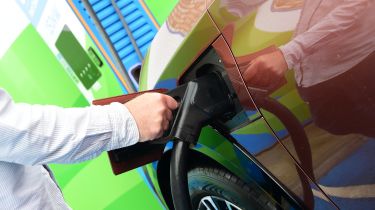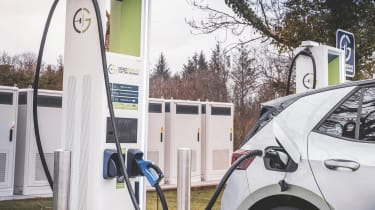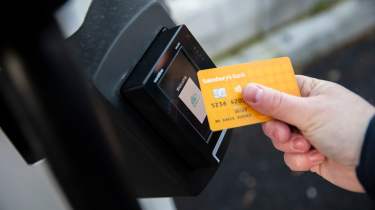How much does it cost to charge an electric car?
There's a lot of confusion around the cost of charging an EV. Here are the facts...

Unlike with petrol or diesel cars where there’s only the forecourt fuel price to consider, there are a lot of variables when it comes to the cost of charging an electric car or a plug-in hybrid.
When you charge an electric car at home or at a public charging station, the cost can fluctuate depending on when you charge, which tariff or charging network you use, how big the battery is and how much energy you need.
Cost of home charging
At home, you can use a three-pin plug or a faster wallbox. The first comes with no installation costs because you’ll have existing sockets in your house, but since a car takes several hours to charge, it’s best done overnight.
Based on the current electricity price cap cost per unit of 22.36p per kWh (excluding the 60.12p/day daily standing charge), you’d pay £8.94 for a 13-hour charge on a 40kWh Nissan Leaf at a 3kW charger. However, as electricity costs less off-peak (e.g. at night), the price of a charge can be quite a bit less depending on your tariff.
A typical wallbox home-charging unit can supply power between 3 and 22kW, with higher output equating to faster charge time. This is convenient but also potentially money-saving, as a whole charge may be able to take place during off-peak periods.
Costs of public EV charging stations
The cost of using public charging stations varies, but we’ll take BP Pulse (formerly Polar), one of the largest providers of such stations, as an example.
Your first option is a BP Pulse subscription at £7.85 a month, which then gives a discount on charging rates across the network, starting at 44p/kWh on a 7kW charger. If you don’t wish to subscribe, you sign up for a free standard membership, but will pay a mid-rate tariff starting from 59p/kWh on a 7kW charger, 77p on a rapid charger or 83p on an ultra-fast 150kW+ charger.
If you wish to pay via contactless and without a free membership, you can hook up to any BP Pulse chargepoint as a guest, but will pay the highest tariff starting from 59p/kWh, 79p/kWh or 85p/kW for 7kW, rapid or ultra-fast charging respectively.
It’s worth noting that maximum charge speed is ultimately dictated by the car’s onboard charger and the supply of electricity at the location, at the time.
Cost of motorway charging
On the motorway, you’ll probably find Gridserve charging stations (formerly Ecotricity) although the variety of different providers is growing.

Gridserve customers pay 49p/kWh on an AC charger (up to 22kW) and no membership is required. Use Gridserve’s network of faster DC chargers (up to 350kW) and you'll pay 79p/kWh.
The company claims that its chargers can provide 80–240 miles of range in 20 minutes and these are designed for quick top-ups to get you home or to your destination. Again, this will ultimately depend on your car’s maximum charging speed.
UK public charging tariffs: prices on different networks
The cost of public charging varies greatly. Prices depend on the provider, which may also have different rates based on charging speed, location and whether you have a subscription. Below are the top performers from our last Driver Power Chargepoint survey, outlining what you can expect to pay:
Ionity
- 53p/kWh with £5.49/month subscription, 43p/kWh with £10.50/month subscription
- 74p/kWh without a subscription
Gridserve
- 49p/kWh up to 22kW AC
- 79p/kWh up to 350kW DC
BP Pulse
- 59p/kWh 7kW AC (44p with subscription, 59p PAYG, 59p contactless)
- 79p/kWh 43kW AC/50kW DC (63p with subscription, 77p PAYG, 79p contactless)
- 69p/kWh 150kW (83p with subscription, 83p PAYG, 85p contactless)
Osprey
- 79p/kWh (flat rate, no subscription offered)
Pod Point
- Varies by charger location and speed, as well as time of day. Prices for each location available on Pod Point app
Instavolt
- 85p/kWh (flat rate, no subscription offered)
Tesla supercharger
- Free for some Tesla owners
- £8.99/month or £90 membership required otherwise
- Price varies by location, non-Tesla cars pay more
Shell Recharge
- 51p/kWh 5kW AC on-street
- 79p/kWh 7–22kW AC
- 79–93p/kWh 50–175kW DC, location dependent
GeniePoint
- 79p/kWh peak (0800–1959), all chargers
- 75p/kWh off-peak (2000–0759), all chargers
Chargeplace Scotland
- Free–£1.50/kWh depending on charger speed and location. Connection fee applies in some cases
Should you pay for a public charging network subscription?
Most EV drivers are best off avoiding public rapid chargers where possible and relying on cheaper home charges or free destination chargers. But if you’re likely to be frequenting one particular chargepoint provider and doing a lot of miles, then a paid subscription could well be worth it.
A single 10 to 80 per cent charge of a typical 80kWh battery using Ionity’s ‘Passport’ subscription would cost £19 less, so a session like that once or more a month would provide savings, albeit not compared with cheaper providers that can (in the case of a growing number of Gridserve units) charge an electric vehicle just as quickly.
It’s worth pointing out that Ionity is a joint venture from several major manufacturers, including BMW, Ford and the Volkswagen Group, who tend to offer their own discounts or even free subscriptions for owners. Plenty of other manufacturers have their own deals in partnership with charging providers, so it’s worth checking at time of purchase.
For instance, BMW is – at the time of writing – giving away a year’s subscription to Ionity Plus as part of its BMW Charging Flex tariff to iX1, iX3, iX. I4, i5 and i7 customers buying through main dealers.
Also thrown in is a year of BP Pulse subscription, usually a £7.85-per- month add-on to the Flex tariff, which adds a discount of 15p off per kWh at time of writing.
How does fuelling a petrol car compare to charging an EV?
The cost of electricity has risen significantly of late and that has made charging an electric car more expensive.
Despite that increase, according to research published by the Energy and Climate Intelligence Unit in 2023, the average electric car is still around four times cheaper to fuel than its petrol counterpart.
The research compares a number of popular electric cars with petrol-powered alternatives from the same manufacturer, based on 8,000 miles per year split equally between urban and motorway miles.
The Renault Zoe costs £334 per year to charge, while a Renault Clio cost £1,001. Charging prices were based on 75 per cent at home on a cheaper EV tariff, with the rest across a range of standard tariffs and public charging; the petrol example is based on 95 per cent normal filling stations and 5 per cent from more expensive motorway service stations. The comparison found the Zoe to be three times cheaper to fuel than its petrol equivalent.

Similar comparisons in the same report found the Nissan Leaf to be five times cheaper to fuel than a Nissan Juke, and the Jaguar I-Pace just under four times cheaper to fuel than a petrol-powered E-Pace.
It’s worth pointing out that the figures above are based heavily on home charging at favourable rates. Making such savings is possible if you have the requisite setup – off-street parking and perhaps a wallbox charger – but less so if you depend more on the public charging network, prices for which have risen in recent years.
We can make a rough estimate for public-only charging using the popular MG4 EV SE Long Range as an example – along with the 4.2 miles/kWh figure we saw in our own testing.
Using the Gridserve tariffs of 49p/kWh for AC charging and 79p/kWh for rapid charging as an example, and supposing a 70/30 split between those rates, the above car will cost around £1,105 to charge over 8,000 miles.
Needless to say, it makes sense to make full use of home charging if you can. If not, investigate the cheapest cost per kWh near you, and consider investing in a subscription where applicable to bring that figure down.
Running an electric car for less: top tips
There’s plenty you can do to make an electric car cheaper still to run, of course. Most general fuel-saving advice for internal combustion engined cars still very much applies to EVs, plug-in hybrids and full-hybrid cars, but it might be worth adopting a different approach to route planning.
If your car has regenerative braking to boost battery charge, use it as much as you can. Don’t fall into the trap of putting it in its most aggressive setting, though, because it can be more economical to let the car coast than to use the brake re-gen, and then have to accelerate back up to speed.
Prior to departure, think about the time of day you’re travelling and the roads you’ll use. Rather than spending hours stuck in traffic, could you leave before the rush hour? And the most direct route might not be the quickest or most efficient, either.
Sat-nav apps such as Google Maps and Waze can really help here. They give you the option to set departure or arrival times, and you’d be surprised how much time – and fuel – you could save by setting off 10 or 20 minutes earlier or later.
Google Maps displayed through Android Auto, Apple CarPlay or by your phone secured in a proper mount also provide routing based on real-time congestion data. How many times have we tried to avoid a traffic jam by taking a detour that is even longer? Compared with most car maker’s systems, Google Maps is a genuine time and money saver.
It pays to plan your journey well. Are you using the most efficient route? If you’re going to stop for fuel on the way, can you easily do so off the motorway network to pay less per litre? Does your route avoid potentially costly congestion and low-emission charging zones? Again, Google Maps can help with all of this.
How to save on charging your EV
Charging at home wherever possible is an absolute must as we've mentioned and you can save even more with solar panels linked to your home wallbox to generate and store electricity. Although these can be costly to install.
On longer trips, a charge stop may be unavoidable, so check ahead for a good place to juice up without breaking the bank.
Depending on your car’s charge capacity, you might be paying extra for power deliveries you can’t take advantage of, although some operators offer higher levels of charging without asking users to fork out more than slower units.
It’s worth checking if the maker of your vehicle works in partnership with any suppliers to offer discounted rates, and while you are stopped, perhaps resist the temptation to buy drinks and snacks to pass the time. It’s all too easy to spend as much on such items as on charging – especially given the tactical placement of some chargers near tempting fast food establishments.
There are ways to save at home, too. Whether you are an existing electric vehicle or PHEV owner, or have one on order, you could be eligible for the government’s Home EV charger grant. This allows those who own flats or rent any residential property with off-street parking to claim back up to £350 from the installation cost for a charger. This is also available to those with on-street parking when also installing a ‘cross-pavement solution’.
Now take a look at the longest range electric cars on sale...
Your electric car questions answered
- Electric car FAQ
- Should i buy an electric car?
- What’s the best way to buy an electric car?
- Is a hybrid, plug-in hybrid or electric car right for me?
- Should i buy a used electric car?
- Can i get a plug-in car grant?
- How is electric car range calculated?
- How much do electric cars cost to charge?
- How much do electric cars cost to run?
- How long do electric car batteries last?
- What happens to old electric car batteries?
- Should i get a heat pump on my electric car?
- What are fast charging and rapid charging?
- Should i get a home electric car charger?
- Can i tow with an electric car?
- Is wireless electric car charging the future?
- What’s the history of the electric car?
- What’s the future of the electric car?
Find a car with the experts






